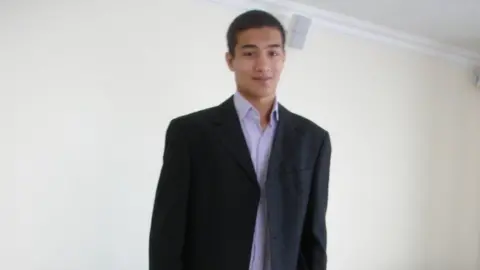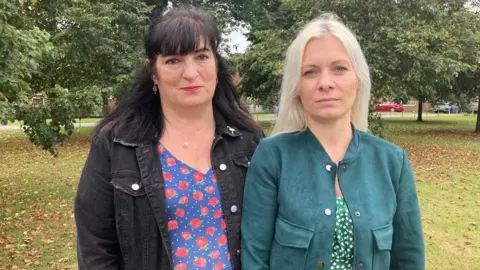Joshua Sahota: Mental health unit death raises coroner fears
 Sahota Family
Sahota FamilyA coroner has raised concerns about how a family was unknowingly allowed to bring a restricted item into a mental health unit before a man's death.
Joshua Sahota, 25, died at the Wedgwood Unit in Bury St Edmunds, Suffolk, on 9 September 2019.
Suffolk coroner Nigel Parsley said Mr Sahota's relatives were not told the item they brought in when visiting was on a restricted list.
The NHS trust which runs the unit said it had improved its internal processes.
Mr Sahota, from Kennett in Cambridgeshire, was taken to the Wedgwood Unit on the West Suffolk Hospital site three weeks before his death as his mental health had declined.
Insufficient staffing levels contributed to his death, an inquest jury at Suffolk Coroner's Court concluded.
Other factors included insufficient observations and one-to-one processes, no clear and concise risk assessments, being slow to develop a care plan and the absence of a documented crisis plan.
 Sahota Family
Sahota FamilyMr Parsley has written to Norfolk and Suffolk NHS Foundation Trust (NSFT), which runs the Wedgwood Unit, and the Department for Health and Social Care (DHSC).
In his prevention of future deaths report, the coroner said the restricted item was a plastic bag, which the family had used to bring in clothing for Mr Sahota.
He said that "had the family known that [the item] was a restricted item, it would not have been taken to the hospital in the first instance".
"There was... no effective communication with the family regarding what items were, and what items were not, allowed onto the ward in Josh's case," he added.
You may also be interested in:
He said he was concerned family and friends of current inpatients "may still inadvertently take a particular item onto [the] ward" or know they have an item, but be "totally unaware" it was restricted.
Mr Sahota's sister Chloe Owens said: "In my mind and the rest of the family's, he was in the best place [to] get the care and treatment he could need to come out and live a life normally again.
"He was meant to be safe."

His father, Malk Sahota, added that he hoped the trust and health minister would "acknowledge the seriousness of the coroner's concerns and set out real and immediate ways in which the ongoing risks can be minimised and patient safety improved".
NSFT said it would study the inquest's conclusion and Mr Parsley's concerns to see if there was any further action required.
Stuart Richardson, chief executive at NSFT, said: "I am deeply sorry for Joshua's death and I am keen to support his family in any way I can.
"I want to assure Joshua's family that we have improved our internal processes following his tragic death, including making sure there is regular, meaningful, one-to-one time with psychology team members to reduce the chances of this happening to anyone else."
The DHSC said every mental health trust should have a clear policy around restricted items, and failures would be investigated by the Care Quality Commission.
A spokesman said "learning lessons when things have gone wrong is essential" and that suicides in mental health inpatient settings have reduced by more than half over the past decade.
"But any number of suicides is too high and that is why we have an ambition to have none - which means every mental health trust must have a clear policy targeting ways to keep continuously bringing down the number of suicides," he added.

Find BBC News: East of England on Facebook, Instagram and Twitter. If you have a story suggestion email [email protected]
